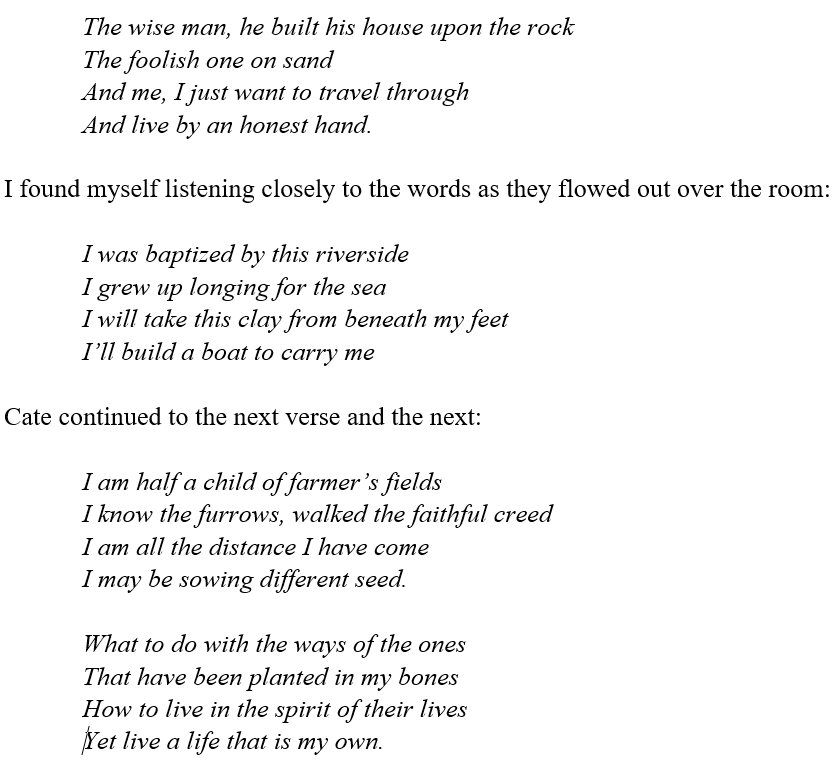A Boat to Carry Me
The lights dimmed. Chatter subsided. Cate took her place on the stool in the center of the small stage, tossed her hair out of her face, played a few warming-up chords on her guitar, and then paused. “I want you all to imagine there is a klezmer band here tonight—imagine a rollicking clarinet and an accordion instead of my lonely guitar.” I knew what song was coming, and I didn’t need to use much imagination because I had heard it played with a klezmer band before. She began to sing:

Our lives were different, Cate’s and mine, but it felt like she was describing my life and my questions. She had grown up in a farming community on the Canadian prairie, the descendant of Russian Mennonites, while I grew up in a college town in Virginia, my Mennonite ancestors from the Swiss alps. They had come to Pennsylvania in the early 1700s, landing in Philadelphia, the city where we were sitting. I wondered what they would have thought of us, sitting here in a club, clearly not “die Stillen im Lande,” (the quiet in the land), that we were supposed to be. We did not stand out as strange or different—at least I hoped I didn’t.
Cate and my sister Carol collaborated on music—I had just heard them perform together at Pendle Hill, a Quaker retreat not far away. Tonight was Cate’s night however, and Carol and I were along just to keep her company.
The music continued, but I was lost in reverie. My life had changed in many ways over the years. I’d had to decide what of my past felt true for me in the present, what I wanted to do differently, and what I needed to let go of completely because it no longer worked. These shifts had come through slow growth and deliberate decisions. I had watched others who seemed to chuck away everything in one angry rebellion, never looking back in their hurry to create as much distance as possible from the past.
I’d never felt that way. Sometimes such drama seemed appealing—full of vitality and excitement, but it wasn’t me. I’m more deliberate and thoughtful. And that’s what I liked about Cate’s song. She didn’t reject the clay on which her life has been built. Instead she deliberately used it to fashioned a boat that could take her to a larger world. That’s what I had been doing, I thought. I just hadn’t said it so artfully.
That evening in a Philadelphia folk club happened many years ago, but those ideas simmered in the back of my mind. When I retired, I finally had time to nurse then into essays and then chapters that slowly grew into a book that now carries the provisional title, The Blistering Morning Mist. I am currently looking for a publisher, a process that may take much longer than I would like, but in the meantime, I’d like to share with you some of the ponderings of my current life, essays from earlier years, and vignettes that were edited out of my manuscript. Who knows where all this will go? Certainly not me, but I invite you to come along on this new venture. I’d be happy for some companions along the way.
I’m in! It will be lovely to hear your voice again.
Good to hear from you, my dear friend, and to read a bit about your life. I wasn’t aware of your move. Glad we can connect in this way.
Lovely, Kathie. I’m in your boat–not pitching out all the past, nor clinging to it. All of life is an adventure.
beautiful and so profound! I too will never forget that night listening to Cate!
Kathie, your voice is clear and planted. Looking forward to hearing more. Love, a.
Thank you, Al. I’m looking forward to writing more and to the conversations that might grow out of that.
Hi Kathie,
I’m so thrilled to see your blog up and running. A wonderful blog it is too!
I love this post. So thought-provoking.
Looking forward to future posts.
Thanks for all your encouragement. I wouldn’t have gotten here without it.